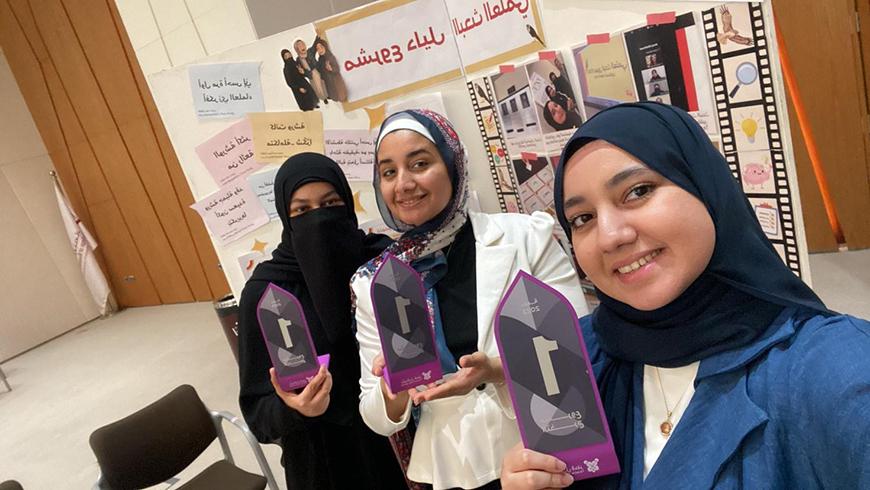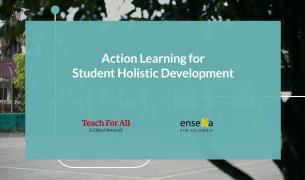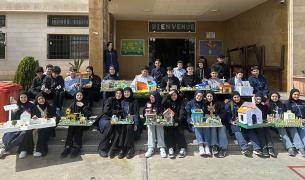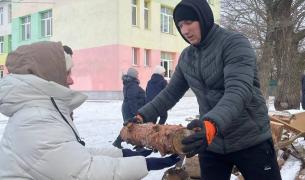The Daleel Scientific Research Guide: From idea to impact

Read this story in Arabic
Earlier this year, Teach For Qatar held a Graduation Projects Exhibition where second-year fellows presented the projects that they had been working on throughout their final year of the fellowship. The exhibition featured 30 diverse projects designed to create a positive and sustainable impact in education, addressing topics related to students, the learning environment, technology, values, and other educational areas. The event reflects Teach For Qatar’s commitment to empowering fellows to transform their educational ideas into impactful, real-world initiatives that contribute to developing Qatar’s education system and enhancing their impact as leaders. The following reflection comes from the winners of the first-place project - the Daleel Scientific Research Guide.
When we first joined Teach For Qatar, we were driven by a deep belief in the power of education to shape the future and by a desire to create an impact that would extend beyond the classroom, leaving a lasting mark on the minds and hearts of our students. We were looking for an opportunity to connect our passion for science with service to our community, contributing to the development of a conscious generation capable of driving meaningful change.
During the fellowship, we discovered a shared ambition: to nurture our students’ skills in scientific research and critical thinking. Through our daily classroom experiences and continuous conversations, it became clear that we carried the same passion, and that working together could lead us to something bigger than a classroom initiative. With our scientific backgrounds and prior experience in conducting and publishing research, we felt confident in our ability to design an authentic resource tailored to the needs of the educational community.
That is how the idea of Daleel was born.
It began with a simple observation: students needed a practical, easy-to-use resource in Arabic that could guide them through the process of conducting scientific research in a clear and engaging way. Many students held the misconception that research was boring, complicated, or disconnected from their reality. They also lacked the essential skills such as formulating hypotheses, evaluating sources, and presenting their results. These challenges became even more evident when we were tasked with supervising school research projects and competitions. We soon realized there was no simplified guide in Arabic to support students or to help teachers build and reinforce basic scientific research skills. That was the moment we started creating worksheets and small activities, testing them in classrooms, and refining them based on student feedback. Over time, this content gradually evolved into a comprehensive project designed to serve both teachers and students across schools.
But the journey didn’t stop at the classroom door. It expanded into training workshops that we delivered for our fellow Teach For Qatar teachers, for educators in different schools, and for students participating in scientific competitions. Throughout the academic year 2024-2025, we used Daleel to train over 62 teachers and helped more than 1,000 students in engaging with scientific research and successfully competing in various competitions. These experiences expanded the project’s reach and proved that it was not just a classroom tool, but an initiative with wide potential for impact.
The support of Teach For Qatar played a significant role in transforming our idea into reality. The program provided us with training, practical experience, and the opportunity to connect with inspiring experts and partners who enriched the project with their valuable contributions.
This effort was crowned when Daleel won first place among 30 graduation projects in the 2023 cohort. In addition, our participation in the global Teach For All network gave our journey a new dimension. It also allowed us to learn from fellows in other countries and share the Daleel experience. This took place through a call we hosted with fellows and alumni from the MENA region, which confirmed that our project is not only a local solution but one that can benefit schools across the Arab region. During this exchange, we presented our project and explored with fellows how they could integrate it in their classrooms and with their students.
The idea of Daleel began with an interactive booklet we designed to help students and teachers understand and apply the steps of scientific research in a fun way within the classroom. Over time, this booklet became the foundation for a series of training workshops we conducted for both teachers and students. It also inspired us to launch an interactive Instagram account to share content created for, and by, the students. Today, we aspire to expand Daleel into broader formats, such as a digital platform, structured training programs for teachers, and a regional network that connects Arab students and emerging researchers across the MENA region.
Our journey with Daleel began in classrooms, inspired by our experiences and born out of a genuine need. What started as an attempt to build the resource we wished had existed has now grown into a dream that extends beyond classroom walls and aspires to reach wider horizons. What excites us about the future of Daleel is the belief that it will grow beyond being just a resource, becoming an impactful tool that guides a generation of young researchers to contribute to a better future.


